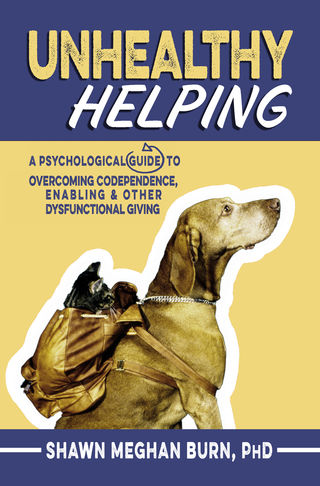Codependency
Codependent and Unhealthy Helping Mindtraps
Six irrational beliefs that trap us in dysfunctional helping and giving hell.
Posted February 1, 2014
Many helpful caring people, particularly those that identify as codependent, impulsively rescue others from their self-imposed predicaments. They stay in dysfunctional helping and giving relationships even when their resources or relationships are strained, or they enable others’ addiction, incompetence, or irresponsibility. The cognitive-behavioral perspective helps us understand how self-defeating thoughts (mindtraps) lead us into dysfunctional helping and giving, and keep us coming back for more. Fortunately, some relief can be found by challenging six common mindtraps.

Mindtrap #1:Catastrophizing. Are you a person that immediately jumps to the worst possible conclusion about someone’s predicament, and assumes that your intervention is necessary to prevent imminent disaster? (e.g., “Without my intervention the other will end up dead, broke, homeless, in jail, fired!”) Has this led you to impulsive rescuing?
Catastrophizing Mindtrap Challenge. Ask yourself: Is it really and truly true that without my help, total disaster will occur and the other won’t survive? Or, is it possible that the other will be okay (and possibly benefit) if they have to solve their own problems or assume their own consequences?
Mindtrap #2:Mind-reading. Are you a person that assumes other people will think badly of you if you don’t continue to give at such a high level? (e.g., “If I don’t help or give, other people will think I am bad or selfish” or, “If I don’t help or give, they will be very angry with me and I won’t be able to stand it”)
Mind-reading Mindtrap Challenge. Ask yourself: Do I really know that other people will think I’m “bad” if I don’t over-give, rescue or enable, or “good” if I do? Can I check this out with people that I respect? Do I know that others will be incredibly mad at me (rather than accepting it, or merely being temporarily irked) if I pull back on my helping or giving? Is it really true that others’ disapproval is so unbearable I must sacrifice myself or is the truth that I can survive others’ displeasure if I determine my help or giving is not really necessary or will not be helpful in the long run? Does rescuing and enabling really protect me from experiencing others’ disapproval?
Mindtrap #3:All-Or-None Thinking. Are you like many dysfunctional helpers and givers who are “black-and-white” thinkers whose absolutist proclamations lead them astray? Do you look at situations and people as completely right or wrong, good or bad (e.g., “If I don’t help, I am a bad or selfish person,” “I love them so I have to give them another chance,” or “I have to help them, they’re family”).
All-Or-None Thinking Mindtrap Challenge. Ask yourself: Is it a fact that I am a “bad” person if I do not rescue, enable, or over-give, and a “good” person if I do? Or can good people sometimes decline to bail others out or set boundaries around their helping and giving? Is it possible that saying “no” to fostering the other’s dependence is what a “good” person does? Is it always the “right” thing to solve others’ problems and the “wrong” thing not to?
Mindtrap #4:Personalization. Do you feel compelled to help or give because you think someone’s negative behavior or circumstances are somehow your fault and therefore your responsibility? (e.g., “If I was a better parent, teacher, spouse, manager (or whatever), they wouldn’t be in this mess, therefore, I am responsible for rescuing them”). This belief often involves confusing having an influence on others with having control over what those others do.
Personalization Mindtrap Challenge: Ask yourself: Is it really true that at this point in time I am responsible for the other’s misfortune such that it is my responsibility to fix it? Even if I bear some responsibility, aren’t there other factors (including the other’s choices) that played a role? What do people I trust say about my responsibility for fixing the other’s problems—why should I believe my distorted thoughts instead of them?
Mindtrap #5:Emotional Reasoning. Do you use your emotions as evidence of facts? For example, you feel distress and alarm over another’s predicament and automatically think you must intervene?
Emotional Reasoning Mindtrap Challenge. Ask yourself: Can I say with certainty that my emotional reactions to others’ predicaments are always or even mostly right and they rarely, if ever, mislead me into unnecessary or harmful helping or giving? Does my empathy ever lead me astray such that I impulsively offer help without considering the costs of helping to others and me? Does honoring my first impulse to rescue or give lead me to make offers I later regret?
Mindtrap #6:Shoulding. Are you a duty-bound person that “shoulds” yourself into carrying the load of others? Do you think things like, “I should be giving and selfless” and “I should sacrifice my time/energy/resources if I am a good spouse/parent/coworker/friend/person”?
Shoulding Mindtrap Challenge. Ask yourself: Am I holding myself to standards that I do not hold others to? Can I soften my “should statements” so they are more reasonable? For example, instead of “I should be selfless and sacrifice myself for others” perhaps I can say, “It is generally good to help others but there are times when it is all right not to.” “I must help or I am a bad person” can be softened to “Being a helpful person is part of what makes me a good person but there are times when being a good person may mean not intervening to solve another’s problems.”
Finally, many codependent people irrationally believe they can solve others’ unmanageable problems. But think about this: Although your good intentions are powerful stuff, are you really so gifted (or omnipotent) that it’s realistic to believe your efforts can solve the other’s problems even if those problems are complicated, the other is not ready for change, and the evidence is that your efforts are not working? Or, does available evidence indicate that you can’t change the other or their situation, or that the other is not ready to live differently? Are you really being fair to yourself if you feel you’re a failure if you back away from trying to fix them or their problems? What would you say to a friend in this situation, would you support them in withdrawing their aid?
Notes

Based on ideas from my book Unhealthy Helping: A Psychological Guide to Overcoming Codependence, Enabling, and Other Dysfunctional Giving available in paperback from Amazon and for Kindle, ibook, Nook, and Kobu e-readers.
* I applied the mindtraps and irrational beliefs described by David Burns’ 1999 book Feeling Good: The New Mood Therapy (Harper Collins Publishers) and by Albert Ellis in The New Guide to Rational Living (Wilshire Book Co; 3rd edition 1975), and Reason and Emotion in Psychotherapy (Citadel, 1974). Mindtraps are most often described in the context of mood disorders but I think they are useful to consider in regards to codependence and dysfunctional helping and giving.




